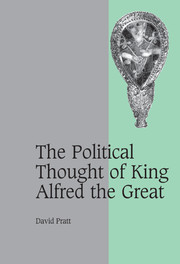Book contents
- Frontmatter
- Contents
- Acknowledgements
- List of abbreviations
- Note on citations
- Chapter 1 INTRODUCTION
- Part I The West Saxon Political Order
- Part II Alfredian Discourse and its Efficacy
- Chapter 7 THE FIELD OF ALFREDIAN KNOWLEDGE
- Chapter 8 THE CONSTRUCTION OF ALFREDIAN DISCOURSE
- Chapter 9 ALFREDIAN TECHNOLOGY: BOOKS AND ÆDIFICIA
- Chapter 10 THE HIERDEBOC AS A TREATISE OF POWER
- Chapter 11 THE DOMBOC AS A REORIENTATION OF ROYAL LAW
- Chapter 12 TRIBULATION AND TRIUMPH IN THE FIRST FIFTY PSALMS
- Chapter 13 THE SEARCH FOR A SATISFACTORY CONSOLATION
- Chapter 14 SEEING GOD AS HE IS
- Chapter 15 CONCLUSION
- Appendix: West Frankish deployment of Solomon's dream
- Bibliography
- Index of manuscripts
- General index
- Cambridge Studies in Medieval Life and Thought Fourth Series
Chapter 12 - TRIBULATION AND TRIUMPH IN THE FIRST FIFTY PSALMS
Published online by Cambridge University Press: 06 July 2009
- Frontmatter
- Contents
- Acknowledgements
- List of abbreviations
- Note on citations
- Chapter 1 INTRODUCTION
- Part I The West Saxon Political Order
- Part II Alfredian Discourse and its Efficacy
- Chapter 7 THE FIELD OF ALFREDIAN KNOWLEDGE
- Chapter 8 THE CONSTRUCTION OF ALFREDIAN DISCOURSE
- Chapter 9 ALFREDIAN TECHNOLOGY: BOOKS AND ÆDIFICIA
- Chapter 10 THE HIERDEBOC AS A TREATISE OF POWER
- Chapter 11 THE DOMBOC AS A REORIENTATION OF ROYAL LAW
- Chapter 12 TRIBULATION AND TRIUMPH IN THE FIRST FIFTY PSALMS
- Chapter 13 THE SEARCH FOR A SATISFACTORY CONSOLATION
- Chapter 14 SEEING GOD AS HE IS
- Chapter 15 CONCLUSION
- Appendix: West Frankish deployment of Solomon's dream
- Bibliography
- Index of manuscripts
- General index
- Cambridge Studies in Medieval Life and Thought Fourth Series
Summary
As songs largely attributed to King David, the Psalter offered special opportunities for expression within the framework of Alfredian discourse. David supplied a potent example of learned kingship, dominated by the demands of Israel's covenant, prefiguring many aspects of Solomonic rule. As a model for kingship, David received additional force from his significance in Gregory's writings, frequently cited as the archetype of humble responsibility. Such features offered unique potential for translation at royal hands, re-enacting Davidic composition. In form as well as translatory method, the vernacular Psalms show every sign of such enhanced exploitation, extending to subjects otherwise associated with the highest sphere of royal intimacy. The outcome was a highly complex form of literary performance, incorporating many layers of imagined reading. United by royal direction, the effect was to reinforce many aspects of Alfredian restraint.
PSALMODY AND ROYAL DEVOTION
Royal translation of the Psalter is not unexpected given the text's clear significance in Alfred's devotional practice. The Psalter's selection relates most directly to his personal prayerbook, containing material necessary for the divine Office, certain Psalms and many prayers. Possessed by the king from an early age, the libellus captures the extreme nature of Alfred's piety, incorporating nocturnal visits to churches for prayer. The daily Office was an obligation normally fulfilled only by ecclesiastics, following a weekly cycle during which all 150 Psalms would be chanted. Alfred's regime may be best explained by the impact of his mysterious illness, reportedly incurred in response to sin.
- Type
- Chapter
- Information
- The Political Thought of King Alfred the Great , pp. 242 - 263Publisher: Cambridge University PressPrint publication year: 2007

